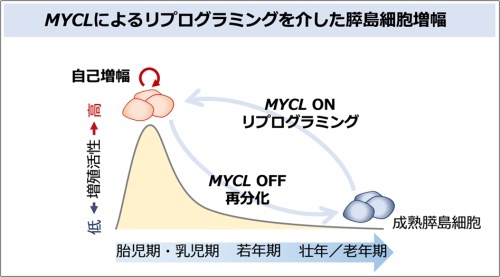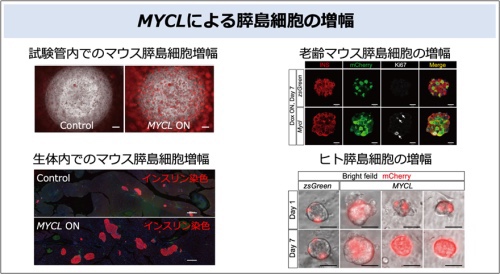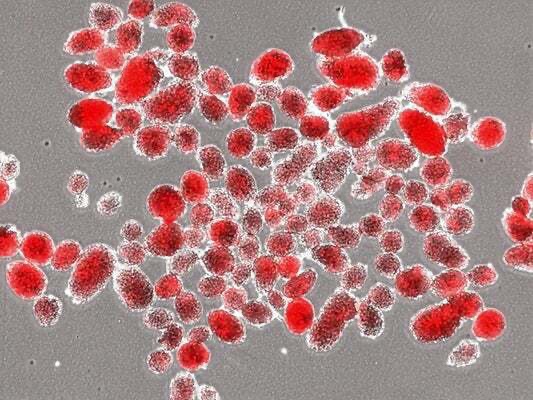


東大:インスリンを作る膵臓のβ細胞を増やす手法開発(動画):
Tokyo Univ:Method to increase β cells in the pancreas that make insulin:
东京大学:开发一种增加胰腺中产生胰岛素的 β 细胞的方法:
ー糖尿病根治に向け、膵臓のβ細胞増やすー
東大・医科研:
糖尿病の根治へ向け、
「インスリンを作る膵臓のβ細胞を増やす、新たな手法の開発」に成功した。
東京大学・医科学研究所が発表しました。
インスリンを作るβ細胞:
糖尿病は膵臓からのインスリン分泌が不足することで発症します。
生後すぐに増殖が止まってしまうため、
インスリン分泌に支障が生じても、再生させることができません。
東大医科研
山田泰広教授マウスを使った実験で、
「MYCL遺伝子が出生前後に膵臓で働き、β細胞の増殖に関わっていること」を発見した。
MYCL遺伝子がβ細胞を増殖:
MYCL遺伝子を働かせることにより、
大人のマウスの膵臓・β細胞を、増やすことに成功しました。
試験管内で実証:
- 試験管内で増殖させたβ細胞を、
- マウスに移植することでも、
- 糖尿病の症状が改善されたということです。
「がん化」リスクが低い:
今回のMYCLを使ってβ細胞を増やす方法では「がん化のリスクも低い」とみられる。
山田教授は、新たな再生治療法になることを期待している。
この内容は科学誌「Nature Metabolism」に掲載されました。
TBS NEWS
https://news.tbs.co.jp/newseye/tbs_newseye6002310.html
MYCL-mediated reprogramming expands pancreatic insulin-producing cells |
Nature Metabolism
Abstract
β cells have a limited capacity for regeneration, which predisposes towards diabetes.
Here, we show that, of the MYC family members,
Mycl plays a key role in proliferation of pancreatic endocrine cells.Genetic ablation of Mycl
causes a reduction in the proliferation of pancreatic endocrine cells in neonatal mice.By contrast,
the expression of Myclin adult mice stimulates the proliferation of β and α cells, and the cells persist after withdrawal of Mycl expression.A subset of the expanded α cells give rise to insulin-producing cells after this withdrawal.
Transient Mycl expression in vivo
is sufficient to normalize the hyperglycaemia of diabetic mice.In vitro expression of Mycl similarly provokes active replication in islet cells, even in those from aged mice.
Finally,
we show that MYCL stimulates
the division of human adult cadaveric islet cells.Our results demonstrate that the induction of Mycl alone expands the functional β-cell population,
which may provide a regenerative strategy for β cells.
https://www.nature.com/articles/s42255-022-00530-y
Research: Diabetes symptoms improve in mice given proliferated pancreatic cells
Friday, Feb. 11,
A group of researchers says
it has improved the symptoms of diabetic mice through transplants of artificially proliferated cells that control blood sugar levels.Pancreatic islet cells
produce the hormone insulin, which regulates blood sugar levels.But the cells
have a limited capacity for regeneration, and the body cannot produce insulin once they stop working.This presents one of the challenges in treating diabetics.
The group, including Professor Yamada Yasuhiro of the University of Tokyo’s Institute of Medical Science,
succeeded in proliferating pancreatic islet cells by extracting them from mice and activating the MYCL gene.
The group found that
the blood sugar levels of diabetic mice dropped to almost normal after the multiplied cells were transplanted into them.They say they also confirmed that the activation of MYCL triggers the proliferation of human adult islet cells as well.
NHK WORLD-JAPAN News